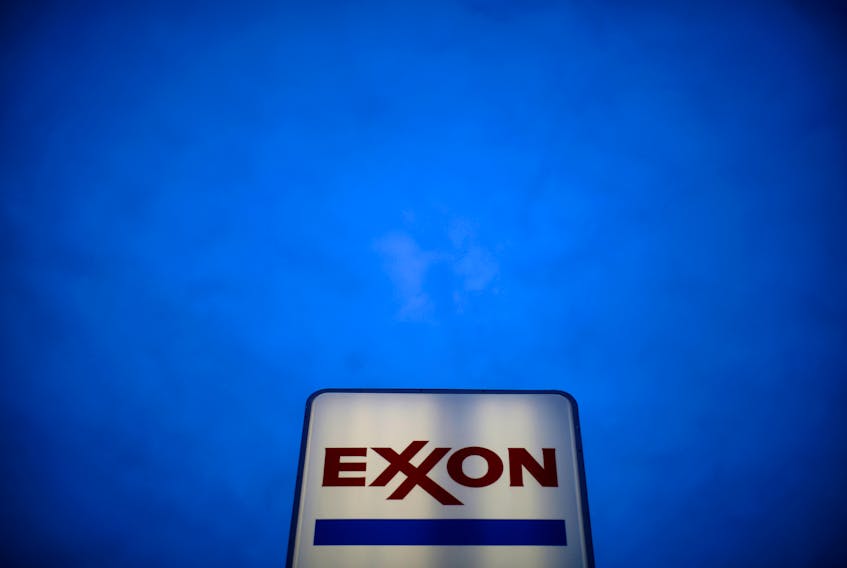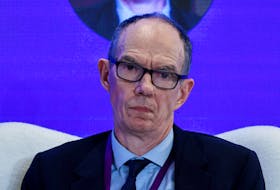By Jennifer Hiller and Shariq Khan
HOUSTON (Reuters) - Exxon Mobil Corp is lowering its ambitions for oil and gas output, it said Wednesday, as it focuses on cutting costs and preserving dividends to win back investors that have soured on the company after years of overspending.
The top U.S. oil producer incurred a historic loss of $22.4 billion last year and is trying to convince a skeptical Wall Street that it can rebound after years of overspending left it deeply indebted and lagging behind rivals better geared for a world demanding cleaner fuels.
Exxon last year fell out of the Dow Jones index of top U.S. companies and shares fell to a two-decade low. Activist investors are pushing it to lessen its reliance on fossil fuels.
"The priority right now is to rebuild the balance sheet," Exxon Chief Executive Darren Woods said on a media call following a virtual analysts day that emphasized the company's commitment to lower spending and reducing debt, which has ballooned to $67.6 billion from $37.8 billion two years earlier.
That said, some analysts criticized Exxon's spending plans, saying the company's focus is likely to shift more to oil than gas, unlike rivals Chevron Corp and Royal Dutch Shell. It is also taking a measured approach to spending in its low-carbon group as other global oil giants aggressively move towards renewable projects.
Woods reaffirmed plans to keep annual project spending at or below $19 billion in 2021 and between $20 billion and $25 billion through 2025. Production will remain largely flat at around 3.7 million barrels of oil and gas per day.
Previously, Woods had planned to hike spending to as much as $35 billion per year to build production, but has reversed course after costly misfires on U.S. shale and Canadian oil sands.
Shares rose 0.8% to $56.52. The stock is up more than a third this year, but over the longer term trails broader averages.
Oil and gas production spending will focus on Guyana, Brazil and U.S. shale oil. The company expects its 400,000 barrels of daily output in west Texas and New Mexico to rise to about 700,000 by 2025, "based on market conditions," said Senior Vice President Neil Chapman. Two years ago, it forecast 1 million barrels per day in the Permian as early as 2024.
Overall output is likely "to steadily shift from gas to liquids, which is at odds with most peers," said Biraj Borkhataria, analyst with RBC Capital Markets.
Exxon vowed to increase its investments in carbon capture and storage as part of a new low-carbon business. Such efforts will account for about 3% of new spending, Exxon said, up from 1% previously.
"It is still far from the double-digit levels of companies such as Shell and Total," said Pavel Molchanov, analyst with Raymond James.
Exxon expects $2 billion of a proposed $3 billion in savings from workforce reductions and efficiencies, said Andrew Swiger, chief financial officer. It has said it could cut around 14,000 employees and contractors, or 15% of its global workforce, by the end of the year.
Engine No. 1, an activist firm that is trying to place four new directors on Exxon's board, was critical of the company's efforts.
"ExxonMobil today presented a vision of the future that we believe risks continued long-term value destruction, including a lack of serious diversification efforts and the hope that carbon capture will enable the company to avoid long-term evolution," the firm said in a press release.
On Monday, Exxon named activist investor Jeffrey Ubben and former Comcast executive Michael Angelakis to its board as it attempts to assuage investor concerns.
"Maybe the best news about the board additions is that the 'our way or the highway' position that Exxon has taken for many years may be changing," said Mark Stoeckle, senior portfolio manager at Adams Funds.
(Reporting by Jennifer Hiller in Houston and Shariq Khan in Bengaluru; Editing by Jonathan Oatis and Lisa Shumaker)









